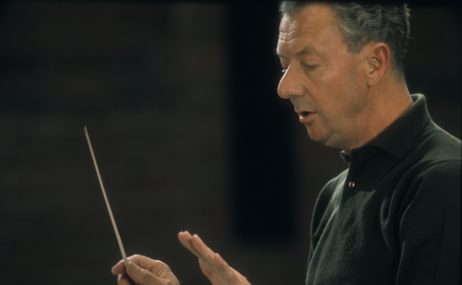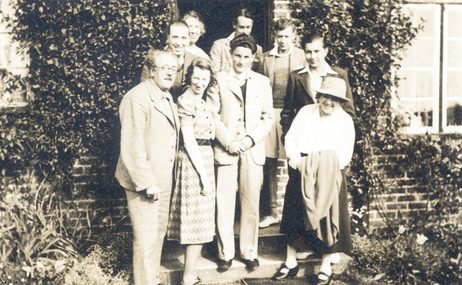Presented by Diana Moore
For Britten’s second Canticle, he adapted the Chester Miracle Play retelling of the Old Testament story of Abraham and Isaac. Abraham, the father, heard a ‘voice of God’ telling him to sacrifice his beloved son Isaac; having agreed to do this as proof of his faith, an ‘angel’ then tells him he may sacrifice a ram instead, and spare his son. The character of Abraham is given to the tenor voice in Britten’s setting, and Isaac was – as Diana Moore explains in this week’s film – originally written for a mezzo-soprano. The first performers of the work were Peter Pears and Kathleen Ferrier, with Britten on the piano. The tenor and mezzo-soprano voices combine, to magical effect, to represent the voice of God.
It is number two in a series of five substantial vocal works composed over a period of nearly 30 years, and like several of the others it was composed shortly after a major opera. Canticle II appeared in January 1952, not long after the premiere of Billy Budd – another tale of a young innocent, who is effectively ‘sacrificed’ at the end of the opera. The Canticle doesn’t share any musical material with Billy Budd; but some of it does find its way 10 years later into Britten’s War Requiem. In the ‘Offertorium’ movement the choir sings of that which was promised to the descendants of Abraham – to music bearing a strong resemblance to a passage in Canticle II, sung by Isaac. In the Canticle, the son is spared, and Abraham’s descendants continue. However, in the War Requiem it is juxtaposed with Wilfred Owen’s poem ‘The Parable of the Old Man and the Young’ which re-tells the story with savage irony, concluding:
When lo! An angel called him out of heaven,
Saying, Lay not thy hand upon the lad,
Neither do anything to him. Behold,
A ram, caught in a thicket by its horns;
Offer the Ram of Pride instead of him.
But the old man would not so, but slew his son,
And half the seed of Europe, one by one.
Britten re-uses his ‘voice of God’ music describing the angel, but this time with a horrific conclusion. Canticle II is a work that allows a glimpse of the horrific lengths Abraham is prepared to go to in its turbulent middle section; yet its conclusion allows a grateful resolution. The War Requiem, a decade later, does not allow such consolation.
IMAGE OF SCORE © BOOSEY & HAWKES

Work of the Week Special: War Requiem
In the 100th anniversary year of the Armistice (11 November 1918) Britten’s War Requiem, has a particular significance. It is not only a…
A Song at The Red House: 'Tell me the Truth About Love', by Benjamin Britten
Soprano Elise Caluwaerts performs one of Britten's cabaret songs, with a witty text by WH Auden. Accompanied by Lucy Walker on Britten's Steinway piano…
Work of the Week 24. Violin Concerto
Presented by Roger Wright
